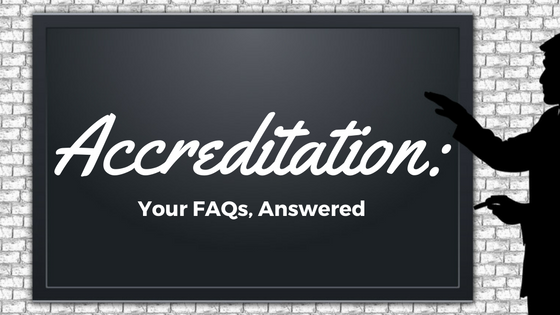
You may have heard of accreditation for the institution or program at which you teach. Here are answers to some of your most frequently-asked questions about accreditation.
What is educational accreditation?
Educational accreditation is a quality assurance measurement that is given after an external body evaluates the services and operations of educational institutions or programs. If the appropriate standards are met, the agency grants the institution accredited status. Importantly, no educational institution in the U.S. is required to seek accreditation, but recognized benefits of accreditation have led most schools to seek the status.
What’s the difference between regional and professional accreditation?
The major difference between regional and professional accreditation is the type of institution or program to which each is awarded. Most post-secondary institutions are accredited by a regional accrediting commission, which are given to an entire institution. On the other hand, some specialized accrediting agencies give accreditation to specialized or vocational institutions or programs, like professional schools.
What do accrediting agencies do?
Accrediting agencies do six main activities:
- Standards (the accreditor establishes standards for accreditation);
- Self-study (the institution or program seeking accreditation prepares a self-evaluation report that measures its performance against the standards created;)
- On-site evaluation (a team of peers selected by the accreditor reviews the institution on-site to determine if the applicant meets the standards;)
- Decision and publication (the accreditor grants accreditation and lists the applicant in an official publication with other accredited institutions or program;)
- Monitoring (the accreditor monitors each institution or program to verify it continues to meet the standards);
- Reevaluation (the accreditor periodically reevaluates each institution or program to ascertain whether continuation of accreditation status is justified).
What do my credentials as an adjunct have to do with accreditation?
The regional accrediting agencies who accredit member schools in their regions typically have faculty hiring requirements; here is an example: all instructors, including adjuncts, must be qualified and must undergo routine performance evaluations; must receive necessary support, such as the materials needed to teach their classes; and must be given a voice in curriculum planning and other institutional decisions. Thus, your credentials as an adjunct mean that an institution might not receive accreditation if these conditions are not met fully.
How do accrediting agencies interact with the U.S. Department of Education?
The federal government relies upon accrediting agencies to determine quality delivery of service to students, and as a result, students are only able to obtain federal financial assistance (such as student loans or Pell Grants) if their institution has achieved the necessary accreditation status. The accreditation must be granted by an accreditation organization recognized by the USDE.
In addition, the USDE reviews the effectiveness of accrediting organizations, and its recognition is based on ten standards including attention to recruitment and admission practices, fiscal and administrative capacity and facilities, and success with respect to student achievement.
I’ve heard controversy about possible changes in accrediting. What’s the controversy all about?
Many are concerned by the conflict of interest that may exist in the accreditation system: accrediting agencies, who are paid by the institutions over which they exercise review, naturally rely upon institutions and programs for revenue, so some argue that this creates incentives for them to be lax in their application of standards. The U.S. Department of Education has threatened to limit, suspend, or terminate federal recognition of some accrediting commissions, given non-compliance with federal regulations. Some view this as a broader trend of moving towards governmental accreditation, effectively putting accrediting agencies out of business.

